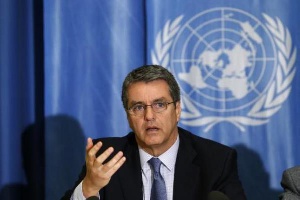The World Trade Organisation has reiterated the importance of the Trade Facilitation Agreement and has lauded member states that have so far ratified the agreement.
Deputy Director General of the World Trade Organisation, Dr. Fredrick Yonov Agah speaking during the national single window conference held in Ghana recently under the theme:
Single Window and the WTO Trade Facilitation Agreement – Key Tools for Development opined that by ratifying the agreement, members were showing their commitment to the Multilateral trading system, while following through on the promises made when the deal was struck in Mali in 2013.
According to him, bringing the deal into force means that the WTO and member countries can begin to count the numerous benefits that comes along with the agreement and catapult such benefits into reality.
Dr. Yonov intimated that one of the key aims of the agreement is to improve transparency of the import and export environment, streamline and simplify border procedures as well as enhance cooperation among border agencies. ‘’In doing so, the TFA is expected to make traditional business cheaper, faster and easier.
Least developing countries in particular stand to gain the most from the full implementation of the Trade Facilitation Agreement because they currently have more complicated border procedures and therefore higher cost of doing business’’ he said. Dr Yonov said the Single Window was only one of the 36 provisions in the trade facilitation agreement, stating however that the single window on its own can go a long way to help governments achieve the goal of reducing time and cost of doing business.
He stressed the important role the private sector can play in the scheme of things particularly with the implementation of the Trade Facilitation Agreement. ‘’It is equally important for the private sector to help government in developing its implementation strategy.
The Trade Facilitation Agreement allows each country to determine when it will implement each of the 36 provisions of the agreement based on priorities and level of commitment.
In addition, the language of the provisions is not restrictive, allowing each country the flexibility to implement the agreement in a manner best suited to its unique situation’’ he further noted.
For this reason he explained, the private sector and government’s need to work together at ensuring that the TFA is implemented in a manner that will lead to meaningful reforms in the various member countries.
The private sector he noted can help governments appreciate trader priorities, share their experiences and work with the governments to develop solutions to the myriad of challenges inhibiting their businesses.
Dr. Yonov intimated that it was imperative for the private sector to have a say in how and when the Trade Facilitation Agreement’s majors are implemented.
Benefits of TFA to government agencies
The implantation of the Trade Facilitation Agreement according to Dr. Yonov will also greatly benefit government agencies in the conduct of their day-to-day jobs.
According to him, the agencies at the borders will be able to operate more effectively and more efficiently, using modern techniques and will be able to focus their attention on where it is needed most culminating in the concomitant increase in revenue collection and enhanced security.
‘’In negotiating the Trade Facilitation Agreement, governments saw the need for close collaboration between government and the private sector and between the numerous government agencies involved in overseeing traditional trade and for this reason, the TFA requires all countries to create the national trade facilitation committee that will provide the forum for all parties to work together and proffer guidance and advice on the implementation of the agreement’’ he stated.
He added that the WTO was not oblivious of some of the challenges that some member countries will face in their quest to fully implement the Trade Facilitation Agreement, adding that the single window represents one of the most difficult provisions of the agreement to implement.
‘’Just as all WTO members worked together to create the agreement, we must all work together to see it through to its full implementation and that is why I am pleased that this conference has brought together so many stakeholders that is providing an opportunity for sharing of best practises’’ he concluded.
Business News of Sunday, 18 June 2017
Source: Kennedy Mornah

















